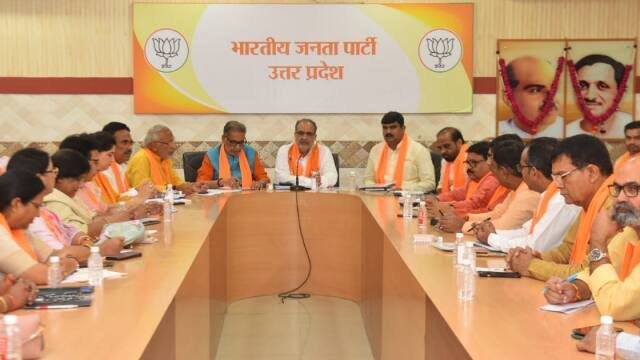The Bharatiya Janata Party (BJP) has emerged as one of the most dominant political forces in India over the past few decades, largely due to its charismatic leadership, particularly Prime Minister Narendra Modi, and its ideological commitment to Hindutva. However, despite its national prominence, there are growing concerns about the functionality and effectiveness of BJP’s state units across the country. These concerns highlight a range of issues from the arbitrariness of top leaders of state units, to the sidelining of grassroots workers, and the undue interference of the Rashtriya Swayamsevak Sangh (RSS) in party affairs.

The Role of Central Leadership
The central leadership of the BJP, especially figures like Narendra Modi and Amit Shah, has played a pivotal role in the party’s successes. Their ability to galvanize support and drive the party’s agenda has been instrumental in winning elections at the national level. However, this top-down approach has also led to a centralization of power, which has inadvertently weakened the party’s state units. State leaders often find themselves overshadowed by the central leadership, resulting in a lack of autonomy and initiative at the state, district, and mandal (local) levels.
Sidelining of Grassroots Workers
Grassroots workers are the backbone of any political party, responsible for mobilizing support, engaging with the community, and implementing the party’s agenda at the ground level. However, there are increasing reports of BJP’s grassroots workers feeling sidelined and underutilized. Many of these workers, who have been loyal to the party for years, are not being allotted meaningful work or responsibilities. This not only demoralizes the workers but also weakens the party’s organizational structure.
The sidelining of these workers appears to be a strategic move by some top leaders to consolidate their power and eliminate potential threats from within the party. By weakening the influence of dedicated workers at the lower levels, these leaders ensure that their authority remains unchallenged. However, this short-sighted approach undermines the party’s long-term sustainability and effectiveness.
Arbitrary Decision-Making
Arbitrary decision-making by top leaders of state units has become another significant issue within the BJP. Decisions regarding candidate selection, policy directions, and organizational changes are often made without adequate consultation with state and local leaders. This top-down approach alienates those at the grassroots level and leads to decisions that may not reflect the local realities and needs.
For instance, the selection of candidates for elections is a critical process that requires an in-depth understanding of the local electorate. When these decisions are made arbitrarily by the central leadership, it often results in the selection of candidates who may not have strong local connections or who may be perceived as outsiders, thereby weakening the party’s chances in local elections.
Impact of RSS Interference
The RSS, as the ideological mentor of the BJP, has historically played a significant role in shaping the party’s policies and direction. However, there are growing concerns about the RSS’s increasing interference in BJP’s organizational matters. This interference often manifests in the form of ideological policing, candidate selection, and strategic decision-making.
While the RSS’s involvement can provide ideological coherence and support, excessive interference can lead to conflicts and disruptions within the party. State leaders and grassroots workers may feel undermined if they perceive that the RSS is imposing decisions without considering their inputs and the local context. This can lead to a sense of disenfranchisement and weaken the party’s organizational unity.
Consequences for BJP’s Organizational Strength
The issues outlined above have several potential consequences for the BJP’s organizational strength. Firstly, the demoralization and sidelining of grassroots workers can lead to a decline in active participation and engagement at the local level. This weakens the party’s ability to mobilize support and effectively implement its agenda on the ground.
Secondly, the arbitrary decision-making process and lack of autonomy for state units can result in a disconnect between the party’s leadership and its base. This disconnect can manifest in electoral losses, as seen in various state elections where the BJP has struggled to replicate its national success at the state level.
Thirdly, excessive interference by the RSS can lead to internal conflicts and factionalism within the party. While the RSS’s ideological guidance is valuable, its overreach into organizational matters can create friction and undermine the party’s cohesion.
A Way Forward
To address these challenges, the BJP needs to undertake several strategic measures to revitalize its state units and strengthen its organizational structure.
- Decentralization of Power: The central leadership should actively work towards decentralizing power and giving more autonomy to state and local leaders. This would enable state units to make decisions that are more attuned to local contexts and needs.
- Engagement with Grassroots Workers: The party must prioritize the engagement and inclusion of grassroots workers. By allocating meaningful responsibilities and recognizing their contributions, the BJP can boost morale and ensure active participation from its base.
- Transparent Decision-Making: Implementing a more transparent and consultative decision-making process can help mitigate the issues arising from arbitrary decisions. Involving state and local leaders in key decisions will ensure that these decisions are well-informed and broadly supported.
- Balanced Role of RSS: While the RSS’s role as an ideological mentor is important, there needs to be a clear delineation of responsibilities to avoid excessive interference in organizational matters. Establishing a formal mechanism for consultation and coordination can help balance the RSS’s influence while maintaining the party’s autonomy.
- Leadership Development: Investing in leadership development at all levels of the party can ensure a steady pipeline of capable leaders who can take on responsibilities and drive the party’s agenda forward. This can also help in reducing the dependency on a few top leaders and create a more resilient organizational structure.
Conclusion
The BJP’s state units are facing significant challenges due to sidelining of grassroots workers, arbitrary decision-making, centralization of power, and excessive interference by the RSS. Addressing these issues is crucial for the party’s long-term success and organizational strength. By decentralizing power, engaging with grassroots workers, ensuring transparent decision-making, balancing the RSS’s role, and investing in leadership development, the BJP can revitalize its state units and strengthen its overall organizational framework. This will not only enhance its electoral prospects but also ensure sustained engagement and support from its base across the country.
4o



Leave a Reply